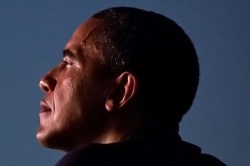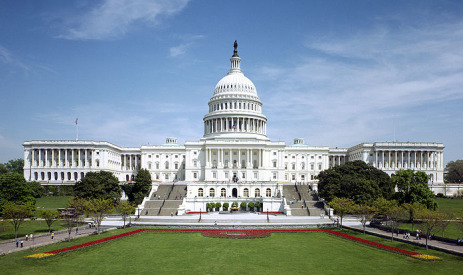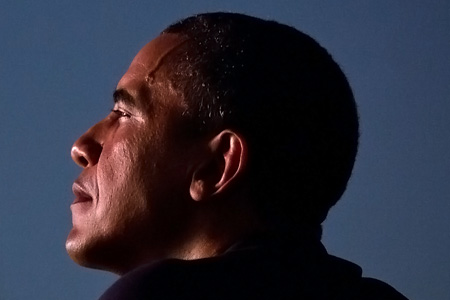
White HouseWhat does Obama really want to achieve on climate change and energy? Maybe we’ll finally find out.
President Obama made a nod to climate change in his reelection victory speech, but does he actually intend to act on the issue in his second term? Will he follow up on his 2008 promise to slow the rise of the oceans, or will he stick with his oil-, gas-, and pipeline-loving “all of the above” energy strategy? And could he get anything through Congress anyway?
“Obama will likely stay the course on his current energy and environmental policies,” writes David Biello at Scientific American.
That means more executive orders like the one that raised vehicle fuel efficiency standards, and continued progress on regulatory efforts to restrain greenhouse gas emissions and other air pollution from coal-fired power plants.
… [I]nnovative programs such as the Advanced Research Projects Agency–Energy will continue to attempt to invent a future of cleaner energy. And the Department of Energy as a whole will continue to push forward with its “all of the above” energy strategy, which will encourage the rise of shale gas but also continue federal support such as tax credits and loan guarantees for big alternative energy projects, from solar power to nuclear.
Politico also focuses on the prospects for executive action:
Obama’s green energy legacy will be built in the executive branch, as it’s unlikely that the divided Congress will pass major climate or energy legislation. …
On the regulatory front, environmentalists are keeping their fingers crossed that Obama will quickly propose climate change regulations for existing power plants and impose tighter smog standards next year, a plan the president punted on in 2011.
And Brad Plumer at Wonkblog makes note of actions Obama could take without cooperation from Capitol Hill:
The EPA could … set new rules on polluters. There are plenty of unfinished EPA rules on the horizon, all technically mandated by the Clean Air Act. The agency has to figure out how to regulate carbon dioxide from existing power plants, refineries, cement plants, and so forth. There are standards for ground-level ozone pollution (smog) that still need to be revamped. And the EPA faces a choice on how to regulate toxic coal ash waste from power plants. Depending on how the Obama administration handles these rules — and assuming natural gas stays cheap — coal could decline even further.
Natural gas drilling could face tighter regulation. The natural gas boom in the United States, driven by new drilling techniques known as fracking, has upended the energy industry. But fracking also brings with it plenty of concerns — from air pollution to potential water contamination. So far, the states have been regulating the drilling boom. But federal officials have signaled that they may increase oversight in some areas, such as developing national standards for wastewater disposal. That’s an area to watch.
Of course, there’s one big, green step Obama could take all on his own: reject plans to build the northern leg of the Keystone XL pipeline, which would carry tar-sands oil from Alberta, Canada, down toward refineries on the Gulf Coast. The White House and State Department are expected to make the final call on the pipeline sometime next year. Before the election, Obama tried to play it both ways — postponing a decision on the northern half of Keystone, applauding construction of the southern half. Now he’s got to choose a side, and climate activists are already turning up the heat.
Obama will also likely get to choose at least one more Supreme Court justice, which could have big green ramifications:
Phil Radford, the executive director of Greenpeace USA, [said a] fundamental requirement for Obama in a second term would be seeking out Supreme Court candidates who favor ending corporate personhood, the legal concept that bestows businesses with a variety of person-like rights, including the right to influence elections by spending large amounts of money. … “That needs to be number one,” Radford said. “Otherwise he’ll just watch everything he cares about erode over time.”
Is there any energy legislation that might pass Congress? From Politico:
Daniel Weiss, director of climate strategy at the Center for American Progress Action Fund, said it’s possible Congress could approve low-hanging fruit like energy efficiency legislation …
And he predicted that the Obama administration will make “a serious effort” to pass a “clean energy standard” that would require utilities to generate 80 percent of their power from low-carbon energy sources by 2035. Obama has long pushed for a CES, but the proposal has made little progress on Capitol Hill in recent years.
And from Tom Zeller Jr. at Huffington Post:
Fred Krupp, the president of the Environmental Defense Fund, suggested that one way around the Congressional gridlock would be to encourage better management of the prodigious amounts of methane that experts say leaks out into the atmosphere during natural gas production and transmission.
Unlike carbon dioxide, methane is not just a potent greenhouse gas. It’s also a valuable commodity. Krupp believes that bipartisan support for capturing more of it could be an important first step in partisan detente on the climate issue — and one that the president could help to foster. “Some people would support it because we don’t want to waste precious American fuel,” he said. “Others would support it because it’s good for the climate.”
But first: the fiscal cliff. From now through the end of the year, Obama will be tussling with Congress over how to avert a huge set of tax increases and across-the-board spending cuts that will automatically take effect in January if the government doesn’t agree on a budget deal before then. Some greens are hoping to attach favored measures to a big budget package — an extension of the critical production tax credit for the wind power industry, and even (this one’s a real long shot) a carbon tax.
Whether Obama can successfully push through his preferred policies is an open question. But now, with the election behind him, he should at least feel free to tell the country what his preferred policies actually are, and advocate for them. And with superstorm Sandy spotlighting the grim and mounting impacts of climate change, there could be a new opening for a national conversation on the issue — one that a newly energized president could lead.
This post is part of our November 2012 theme: Post-election hangover — whither the climate?



